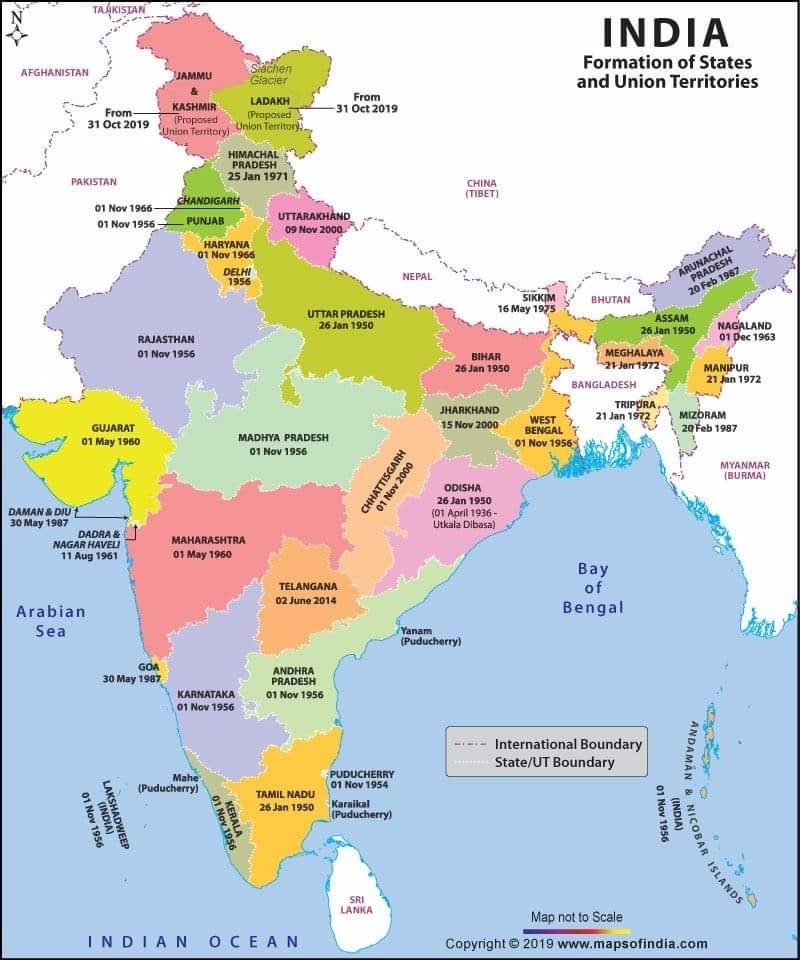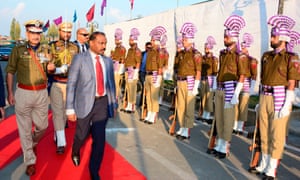Delhi has formally revoked the disputed state of Jammu and Kashmir’s constitutional autonomy and split it into two federal territories in an attempt to integrate it fully into India.
The decision of the prime minister, Narendra Modi, to change Kashmir’s status and tighten the government’s grip over the region in August has stoked anger and resentment while a three-decade armed revolt rages.
At midnight on Wednesday the state was formally taken under direct federal control and split into the territories of Jammu and Kashmir, and Ladakh, bringing an end to decades of semi-autonomous rule.
The state’s constitution, as well as its penal code and state flag, was nullified, and the region is now subject to the same central laws as all other Indian territories. Jammu and Kashmir will have its own state legislature, while Ladakh will be controlled from the capital.
Girish Chandra Murmu, a former bureaucrat who served Modi when he was the chief minister of Gujarat, administered the oath of Kashmir’s first lieutenant governor in a ceremony held under tight security.
Hasnain Masoodi, an Indian parliamentarian from south Kashmir and a former judge, said Delhi’s decision to revoke the status was unilateral and a “massive assault on the identity and autonomy of the state”.
“We were an independent country 70 years ago, we have a history of 5,000 years and suddenly we have been reduced to a municipality,” said Masoodi. “Everyone has a sense of bitterness. There is a sense of injustice, disillusionment and humiliation.”
It was the implementation of a decision first made by Modi’s government 86 days ago, when legislation was rushed through the Indian parliament to approve the end of article 370 of the constitution, which for over 70 years has guaranteed special privileges to the predominately Muslim region. It had been drawn up in 1947 as the foundation of Kashmir’s agreement to be part of India.
A swift annexation of Kashmir followed in August, with tens of thousands of Indian troops deployed into the region, phones and internet shut down, and politicians and public figures placed under arrest. For the past three months, the several million citizens of Kashmir have lived under severe lockdown, with their freedom to work and go to school restricted.
Syed Babar, a lawyer based in Kashmir’s main city Srinagar, said Kashmir’s transformation into a union territory reflected “a political holocaust inflicted on the people”.
“It is the day of political betrayal and beginning of an era where violence as an argument will have justification and takers, which is very unfortunate,” he said.
The Indian government justified its decision to revoke Kashmir’s special status by repeatedly saying it would end militancy in the region, which had continued with varying intensity for the past three decades.
In recent weeks, however, there have been several incidents of violence targeting non-local truck drivers and labourers. In the most deadly incident earlier this week, five labourers from the eastern Indian state of West Bengal were shot dead in the southern Kashmiri district of Kulgam.
One of Kashmir’s militant groups, the al-Qaida-inspired Ansar Ghazwat-ul-Hind, announced a new leadership on Wednesday, less than a week after the police said they had wiped out the group after its chief was killed in a gunfight.
Babar said he feared Delhi’s decision would lead to a rise in radicalisation and would serve as an “invitation to foreign militants”.
He added: “There is no room for dialogue now. The space for politics has been bulldozed and there is nothing to negotiate about between people of Kashmir and government of India.”
In a speech on Thursday, hours after the state’s transition into a union territory, Modi said the removal of article 370 heralded a “new age of political stability” in India.


